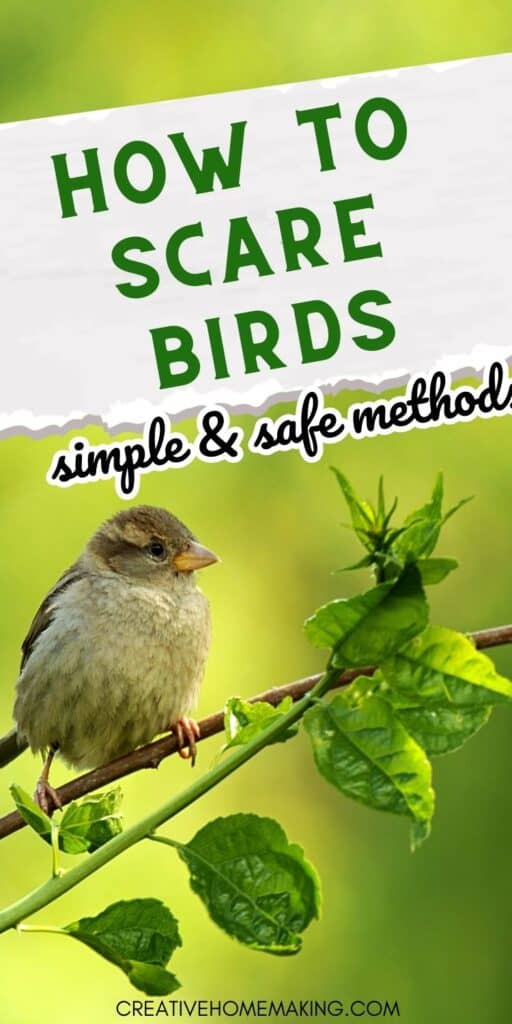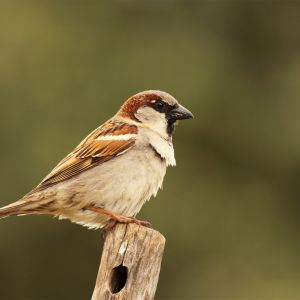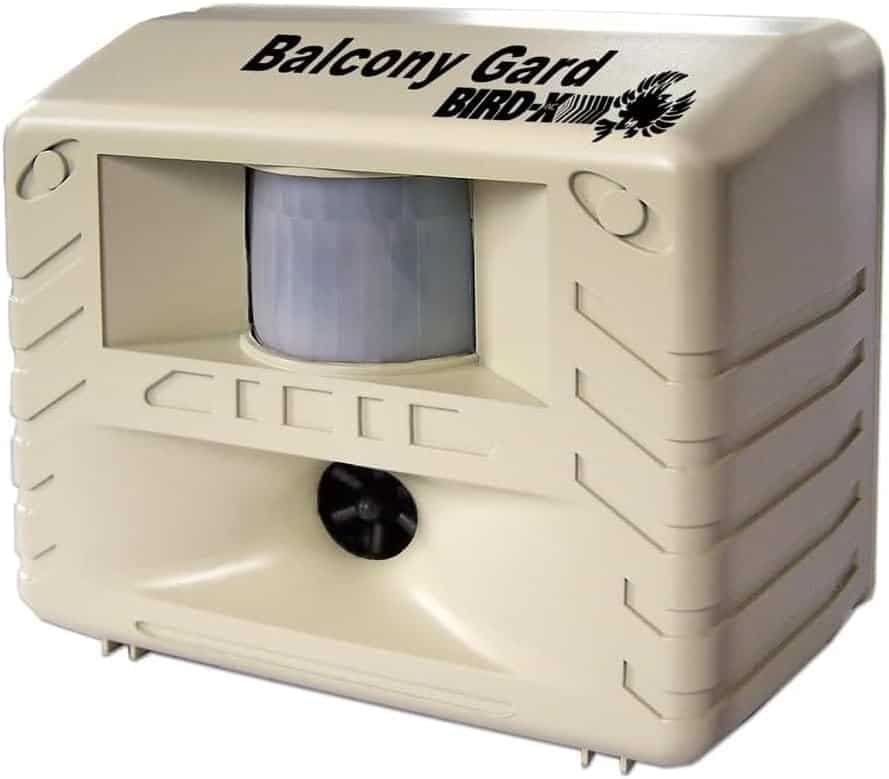Are birds causing trouble in your garden or around your home? Are they eating your crops or leaving droppings everywhere?
This post may contain affiliate links.
If so, it’s time to take action and scare them away. Scaring birds can be a humane and effective way to keep them from causing damage to your property. In this article, we will provide you with some easy and effective ways to scare birds away.
Understanding Bird Behavior
When it comes to scaring off birds, understanding their behavior is crucial. Birds have unique behavior patterns that are influenced by different factors such as food sources, shelter, small bird species, and larger birds. Here are some things you should know:
Territoriality
Many birds are highly territorial and will defend their territory fiercely against any perceived intruders. Understanding this behavior is important as it will help you identify the best approach to scare off birds.
For instance, if you want to scare off a bird that is defending its territory, you might want to use a visual or sound deterrent that mimics a predator.

Food Sources
Birds are attracted to food sources, and if you have a bird feeder or other food sources in your yard, you are likely to attract a lot of birds.
If you want to scare off birds, you might want to consider removing any food sources from your yard. This will make your yard less attractive to birds and reduce the chances of them nesting in your yard.
Related Article: How to Make Homemade Hummingbird Food
Shelter
Birds need shelter to protect themselves from predators and the elements. If you have a lot of trees or bushes in your yard, you are likely to attract a lot of birds seeking shelter.
If you want to scare off birds, you might want to consider pruning your trees and bushes to make them less attractive to birds.
Small Bird Species
Small bird species are more likely to be attracted to bird feeders and other food sources. They are also more likely to nest in your yard, especially if you have a lot of trees and bushes.
If you want to scare off small bird species, you might want to consider using a visual or sound deterrent that mimics a predator.
Larger Birds
Larger birds are more likely to be attracted to open spaces and food sources such as garbage cans. They are also more likely to nest in tall trees and buildings.
If you want to scare off larger birds, you might want to consider using a visual or sound deterrent that mimics a predator or installing bird spikes on your roof or other areas where birds might nest.
Common Bird Species and Their Habits
Pigeons and Their Habits
Pigeons are one of the most common birds found in urban areas. They are known for their cooing sounds and their tendency to gather in large flocks. Pigeons are scavengers and will eat almost anything, including seeds, insects, and food scraps.
Related Article: 8 Ways to Keep Birds Out of the Garden
To scare pigeons away, you can use visual deterrents such as shiny objects or predator decoys. You can also use sound deterrents such as ultrasonic devices or bird distress calls.
Starlings and Their Habits
Starlings are known for their ability to mimic sounds and their tendency to gather in large flocks. They are omnivores and will eat a variety of foods, including insects, fruits, and seeds.
To scare starlings away, you can use visual deterrents such as reflective tape or predator decoys. You can also use sound deterrents such as loud noises or bird distress calls.
Crows and Their Habits
Crows are known for their intelligence and their tendency to gather in large flocks. They are omnivores and will eat a variety of foods, including insects, fruits, and seeds.
To scare crows away, you can use visual deterrents such as scarecrows or predator decoys. You can also use sound deterrents such as loud noises or bird distress calls.
Sparrows and Their Habits
Sparrows are small birds that are often found in urban areas. They are seed eaters and will eat a variety of seeds, including those found in bird feeders.
To scare sparrows away, you can use visual deterrents such as bird spikes or predator decoys. You can also use sound deterrents such as loud noises or bird distress calls.
Related Article: How to Attract Finches
Woodpeckers and Their Habits
Woodpeckers are known for their ability to peck at trees and other wooden surfaces. They are omnivores and will eat a variety of foods, including insects, fruits, and seeds.
To scare woodpeckers away, you can use visual deterrents such as bird netting or predator decoys. You can also use sound deterrents such as loud noises or bird distress calls.
Remember, it is important to use humane methods to scare birds away. Always make sure that the methods you use are safe for both the birds and the environment.
Impacts of Birds on Property
Birds can be a beautiful addition to your property, but they can also cause damage and create a mess. Here are some ways that birds can impact your property:
Damage to Cars
Bird droppings can cause damage to your car’s paint and finish. The acidic nature of bird droppings can eat away at the paint, leaving unsightly marks that are difficult to remove. If left untreated, bird droppings can cause permanent damage to your car’s exterior.
Effects on Patios and Balconies
Birds can create a mess on your patio or balcony, leaving behind droppings and nesting materials. These materials can be difficult to clean up and can cause damage to your property. Bird droppings can also create a slip and fall hazard, making your patio or balcony unsafe.
Impacts on Walls and Eaves
Birds can build nests in the eaves of your home or on your walls. These nests can cause damage to your property and create a mess. Birds can also create holes in your walls and eaves, allowing water and other debris to enter your home.
To prevent damage and mess caused by birds, it’s important to take action. Here are some tips:
- Use bird netting or spikes to prevent birds from landing on your property.
- Install physical barriers like wire mesh or scarecrows to prevent birds from perching on your property.
- Hang reflective tape or shiny objects like old CDs to create visual disturbances and scare birds away.
- Clean up bird droppings and nesting materials as soon as possible to prevent damage to your property.
Health Hazards Associated with Birds
While birds are beautiful creatures that add to the natural beauty of our surroundings, they can also pose health hazards to humans. In this section, we’ll take a look at some of the health hazards associated with birds.
Health Hazards
Birds can carry various diseases that are transmittable to humans. Some of these diseases include:
- Psittacosis: This is a bacterial infection that can be transmitted to humans through bird droppings, feathers, and respiratory secretions. Symptoms include fever, chills, headache, muscle aches, and cough. In severe cases, it can lead to pneumonia.
- Salmonellosis: This is a bacterial infection that can be transmitted to humans through contact with bird droppings, feathers, and other materials contaminated with bird feces. Symptoms include diarrhea, fever, and abdominal cramps.
- Histoplasmosis: This is a fungal infection that can be transmitted to humans through contact with bird droppings. Symptoms include fever, cough, and chest pain.
Precautions
To prevent the spread of diseases associated with birds, it is important to take the following precautions:
- Avoid contact with bird droppings, feathers, and other materials contaminated with bird feces.
- Wear gloves and a mask when cleaning up bird droppings.
- Wash your hands thoroughly with soap and water after handling birds or bird-related materials.
- Keep bird feeders clean and free of bird droppings.
- Avoid feeding birds on the ground, as this can attract rodents and other pests.
By taking these precautions, you can reduce the risk of contracting diseases associated with birds.
Bird Control Methods
If you’re looking to keep birds away from your property, there are several bird control methods that you can use. Depending on your needs, you may want to use a combination of these methods to create an effective bird control plan.
Using Bird Deterrents
Bird deterrents are a type of bird control method that uses non-harmful techniques to keep birds away from your property. Some common bird deterrents include:
- Reflective surfaces: Birds are easily scared by reflective surfaces, such as mirrors or shiny objects. You can use reflective tape or CDs to create a reflective barrier around your property.
- Bird distress calls: Some bird deterrents use recorded bird distress calls to scare birds away. These calls signal to birds that there is danger nearby and they should stay away.
- Fake owls: Fake owls can be effective at scaring away birds, especially if they are placed in a prominent location. However, it’s important that you move the owl around occasionally to avoid birds getting used to it.
DIY Bird Scaring Techniques
If you’re looking for effective and affordable ways to keep birds away from your garden or property, you’ll be glad to know that there are many DIY bird scaring techniques you can try. Here are some ideas to get you started:
Using Aluminum Foil
Aluminum foil is a versatile material that can be used to scare birds away. You can hang strips of foil from trees or other structures to create a shiny and reflective surface that will confuse and deter birds.
You can also crumple up foil into balls and scatter them around your garden to create a noisy and reflective surface that will keep birds away.
Creating Movement with Wind Chimes and Rods
Birds are often scared by sudden movements and loud noises. You can create movement in your garden by hanging wind chimes and rods that will move in the wind.
The sound and movement will help to scare birds away. You can also hang CDs or other reflective objects from the chimes and rods to create a shiny and reflective surface that will deter birds.
Employing Water Features
Birds are often scared of water. You can use this to your advantage by installing a water feature in your garden. A simple bird bath or fountain can be enough to scare birds away. You can also install a sprinkler system that will turn on automatically when birds are detected.
Using Baking Soda and Other Household Items
Baking soda is a common household item that you can use to scare birds away. You can sprinkle baking soda around your garden to create a powdery surface that will deter birds.
You can also mix baking soda with water and spray it onto plants and trees to create a sticky and unpleasant surface that birds will avoid. Other household items that can be used to scare birds away include balloons, scarecrows, and fake predators like owls and snakes.
By trying out these DIY bird scaring techniques, you can create a bird-free environment that will allow you to enjoy your garden and property to the fullest. Remember to experiment with different methods and find the ones that work best for you.
Preventive Measures to Keep Birds Away
If you’re tired of birds invading your space, there are several preventive measures you can take to keep them away. Here are some tips to help you keep birds away from your property.
Proper Maintenance and Cleaning
One of the most effective ways to keep birds away is to maintain a clean and tidy environment. Birds are attracted to areas with debris and clutter, so it’s important to keep your property clean.
Regularly sweep and clean up any debris, such as fallen leaves or branches. Make sure to also keep your gutters and drains clear of any blockages, as birds may use them as nesting sites.
Securing Open Areas
Birds are also attracted to open areas where they can perch and nest. To prevent this, you can secure open areas by installing bird spikes or netting.
Bird spikes are a humane way to prevent birds from perching on ledges and other surfaces. Netting can also be used to cover open areas, such as patios or balconies, to prevent birds from entering.
Customizing and Adjusting Settings
Another effective way to keep birds away is to customize and adjust settings around your property. For example, you can adjust lighting to make it less attractive to birds.
You can also use bird repellent sprays or install motion-activated sprinklers to scare birds away. Additionally, you can customize your landscaping by planting bird-deterring plants, such as prickly shrubs or plants with strong odors.
Frequently Asked Questions
What is the best bird scarer?
There are many different types of bird scarers available, and the best one for you will depend on your specific situation.
Some popular options include automated green lasers, predator decoys, and wind chimes. It’s important to choose a bird scarer that is unpredictable and not easily ignored by birds.
What will keep birds off my porch?
There are several natural methods to keep birds away from your porch. Hanging shiny objects like CDs or reflective tape, using predator decoys such as plastic snakes or owls, and planting herbs like lavender or rosemary are all effective ways to scare birds away.
You can also remove sources of bird food and water, such as bird feeders or nearby ponds, to reduce bird attraction to the area.
What bird are all birds scared of?
There isn’t one specific bird that all birds are scared of. However, many birds are naturally afraid of predators like hawks and owls. Using decoys or other methods to mimic these predators can be an effective way to scare birds away.
Will spraying vinegar keep birds away?
While vinegar has a strong smell that some birds may find unpleasant, it is not a reliable method for keeping birds away. In fact, spraying vinegar on surfaces can actually attract some birds, such as pigeons, who are attracted to the smell of fermented foods.
How can I prevent birds from perching?
Preventing birds from perching can be challenging, but there are a few natural methods that can be effective. Planting herbs like mint or lavender that have strong scents birds dislike, using bird spikes or netting, and removing sources of food and water can all help deter birds from perching.
How do I get rid of birds naturally?
Getting rid of birds naturally can be difficult, as many methods are not always effective or humane. Some natural methods include using decoys or predator calls, using bird spikes or netting, and removing sources of food and water. It’s important to remember to always treat birds humanely and avoid causing harm.
Follow my gardening board on Pinterest.




